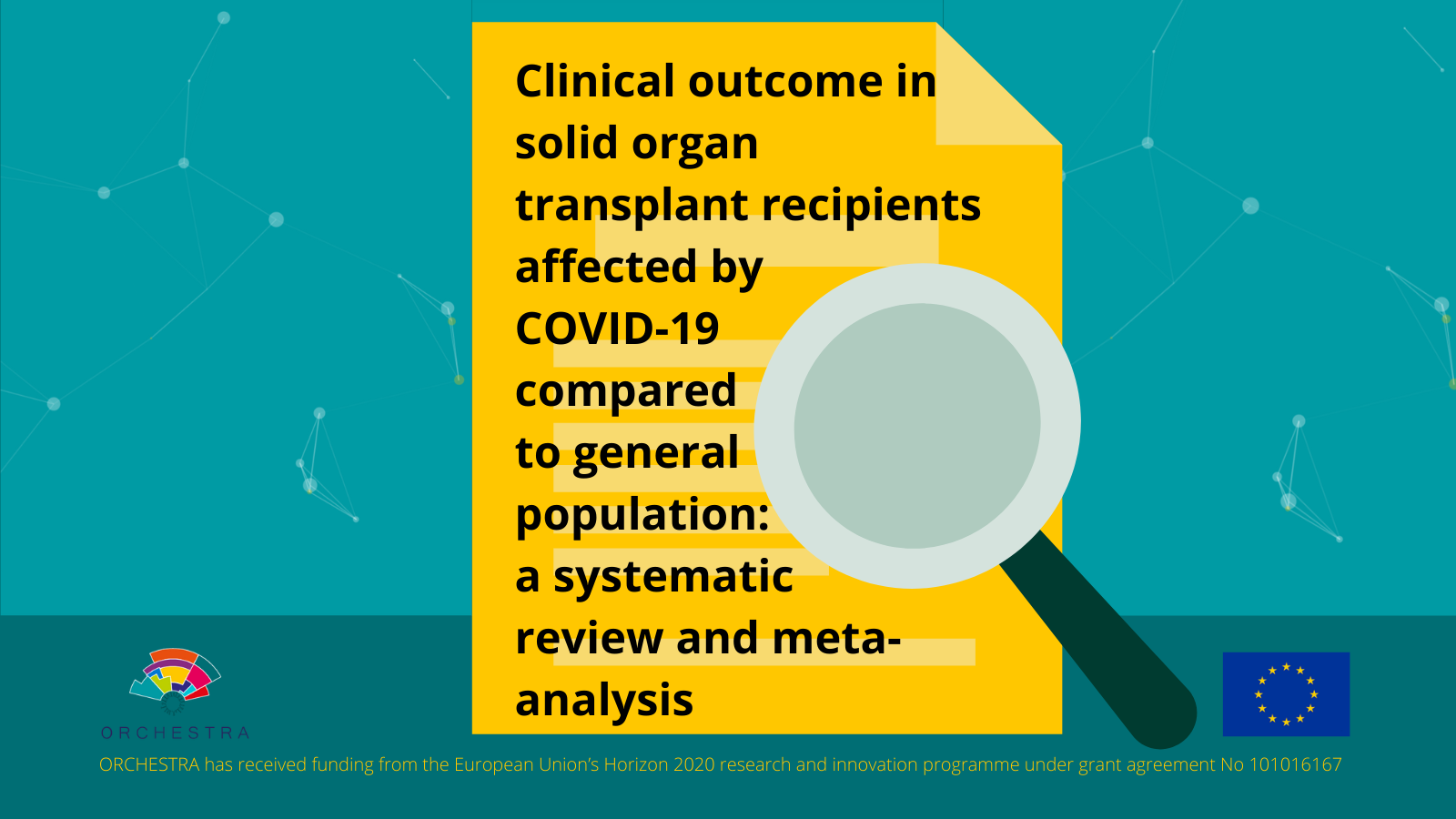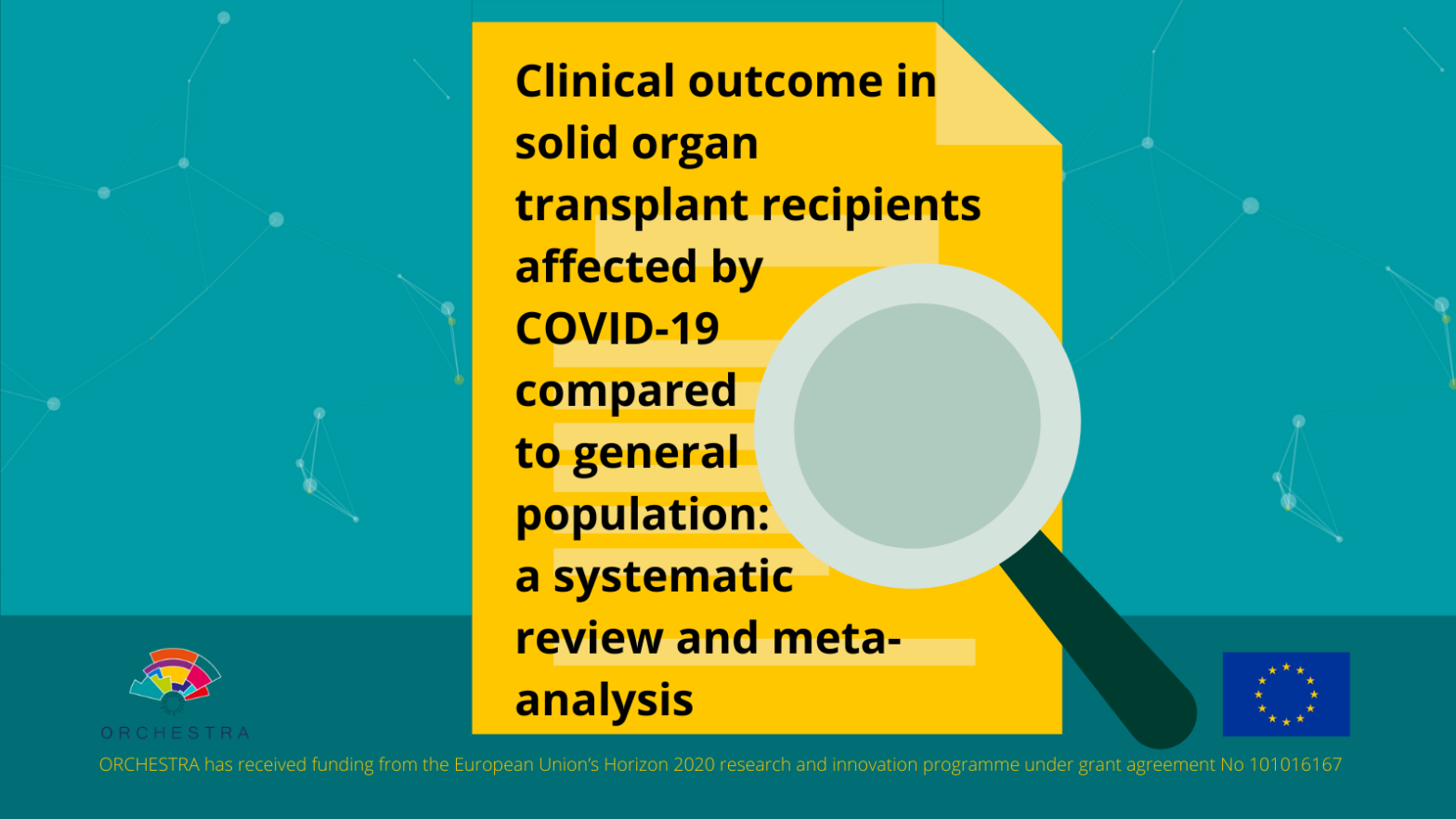Clinical outcome in solid organ transplant recipients affected by COVID-19 compared to general population: a systematic review and meta-analysis
18.05.2022 
Clinical outcome in solid organ transplant recipients affected by COVID-19 compared to general population: a systematic review and meta-analysis
The study was carried out through the collaboration of three ORCHESTRA partners, the University of Bologna (UNIBO), the University of Verona (UNIVR) and the Service Andaluz de Salud (SAS), and is one of the systematic reviews developed for Work Package 2, Task 2.2, led by SAS. It was published in Clinical Microbiology and Infection.
Five questions about the research to Maddalena Gianella, leader of Work Package 4, an associate professor at the Department of Medical and Surgical Sciences at the University of Bologna, and who provides the information on behalf of the team of Work Package 2.
What is the purpose of the study?
A significantly increased risk of complications and mortality has been described in immunocompromised patients affected by COVID-19. However, the effects of COVID-19 in solid organ transplant recipients (SOT recipipients) are still debated due to conflicting evidence from various observational studies. We wanted to investigate the evidence and provide clarity on this issue.
What was the method/what has been done to answer the purpose?
We performed a systematic review with meta-analysis to assess the clinical outcome in SOT recipients with COVID-19 compared to the general population. 3,501 articles were screened, and thirty-one observational studies were included in the meta-analyses. We evaluated the data sources PubMed-MEDLINE and Scopus. Both were independently searched until 13 October 2021. The study eligibility criteria (guidelines for who can or cannot participate in the study) were: Prospective or retrospective observational studies comparing clinical outcome in SOT recipients versus general populations affected by COVID-19. Primary endpoint was the 30-day mortality. Participants of the study were patients with confirmed COVID-19 exposure. The assessment of risk of bias was performed according to the ROBINS-I tool for observational studies.
What are the learnings?:
In our primary analysis, which included studies adjusting for confounding factors, we found no difference in the 30-day mortality rates. No evidence of publication bias was reported. Still, we found a higher risk of ICU admission and occurrence of acute kidney injury in SOT recipients.
What is your conclusion?
No increased risk in mortality was found in SOT recipients affected by COVID-19 compared to the general population when adjusted for demographic and clinical features and COVID-19 severity.
What are the benefits for the public?
This finding can inform public health in potential complications and clinical course of COVID-19 in SOT patients.

Clinical outcome in solid organ transplant recipients affected by COVID-19 compared to general population: a systematic review and meta-analysis
The study was carried out through the collaboration of three ORCHESTRA partners, the University of Bologna (UNIBO), the University of Verona (UNIVR) and the Service Andaluz de Salud (SAS), and is one of the systematic reviews developed for Work Package 2, Task 2.2, led by SAS. It was published in Clinical Microbiology and Infection.
Five questions about the research to Maddalena Gianella, leader of Work Package 4, an associate professor at the Department of Medical and Surgical Sciences at the University of Bologna, and who provides the information on behalf of the team of Work Package 2.
What is the purpose of the study?
A significantly increased risk of complications and mortality has been described in immunocompromised patients affected by COVID-19. However, the effects of COVID-19 in solid organ transplant recipients (SOT recipipients) are still debated due to conflicting evidence from various observational studies. We wanted to investigate the evidence and provide clarity on this issue.
What was the method/what has been done to answer the purpose?
We performed a systematic review with meta-analysis to assess the clinical outcome in SOT recipients with COVID-19 compared to the general population. 3,501 articles were screened, and thirty-one observational studies were included in the meta-analyses. We evaluated the data sources PubMed-MEDLINE and Scopus. Both were independently searched until 13 October 2021. The study eligibility criteria (guidelines for who can or cannot participate in the study) were: Prospective or retrospective observational studies comparing clinical outcome in SOT recipients versus general populations affected by COVID-19. Primary endpoint was the 30-day mortality. Participants of the study were patients with confirmed COVID-19 exposure. The assessment of risk of bias was performed according to the ROBINS-I tool for observational studies.
What are the learnings?:
In our primary analysis, which included studies adjusting for confounding factors, we found no difference in the 30-day mortality rates. No evidence of publication bias was reported. Still, we found a higher risk of ICU admission and occurrence of acute kidney injury in SOT recipients.
What is your conclusion?
No increased risk in mortality was found in SOT recipients affected by COVID-19 compared to the general population when adjusted for demographic and clinical features and COVID-19 severity.
What are the benefits for the public?
This finding can inform public health in potential complications and clinical course of COVID-19 in SOT patients.
###
